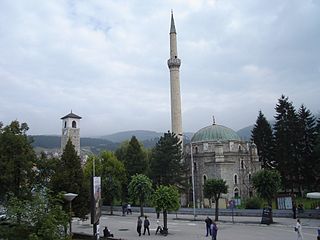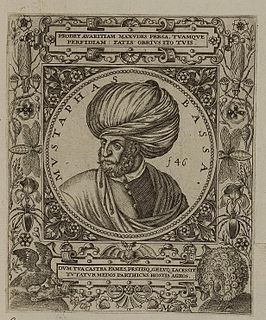 W
WAhmed Djemal Pasha, commonly known as Jamal Basha as-Saffah or Jamal Pasha the Bloodthirsty in the Arab world, was an Ottoman military leader and one-third of the military triumvirate known as the Three Pashas that ruled the Ottoman Empire during World War I and carried out the Armenian Genocide. Djemal was the Minister of the Navy.
 W
WMehmed Fuad Pasha, sometimes known as Keçecizade Mehmed Fuad Pasha and commonly known as Fuad Pasha, was an Ottoman administrator and statesman, who is known for his prominent role in the Tanzimat reforms of the mid-19th-century Ottoman Empire, as well as his leadership during the 1860 Mount Lebanon civil war in Syria. He represented a modern Ottoman era, given his openness to European-style modernization as well as the reforms he helped to enact.
 W
WBodur Hüseyin Pasha was an Ottoman statesman and government official who served many high-level positions in the Ottoman Empire, including governorship of Bosnia (1594–95), of Damascus (1582–83), of Diyarbekir, of Budin, of Aleppo, of Van, of Anatolia, and of Egypt (1573–74).
 W
WKöprülüzade Fazıl Ahmed Pasha was an Ottoman nobleman and statesman, who was a member of the renowned Köprülü family of Albanian origin, which produced six grand viziers of the Ottoman Empire.
 W
WMahmud Nedim Pasha was an Ottoman statesman of ethnic Georgian background, who served as Grand Vizier of the Ottoman Empire between 1871–1872 and 1875–1876.
 W
WMehmed Emin Rauf Pasha (1780–1859) was an Ottoman industrialist and statesman, who was Grand Vizier of the Ottoman Empire twice under Mahmud II and three times under Abdülmecit I during the Tanzimat period of reformation. He was one of the most prominent figures in funding the Crimean War.
 W
WMehmed Emin Namık Pasha was a prominent Ottoman statesman and military reformer, who is considered to be one of the founding fathers of the modern Ottoman Army. He served under five Sultans and acted as counsellor to at least four of them. He founded the Mekteb-i Harbiye, was twice Viceroy of the province of Bagdad, was the first ambassador of the Sublime Porte at Saint-James's Court, was appointed Serasker, he served as Minister of War, became a Cabinet minister, and was conferred the title of Şeyh-ül Vüzera. During a long career that spanned a long lifetime, he was one of the personalities who shaped, as well as were themselves shaped by what historian İlber Ortaylı called “the longest century” of the Ottoman state.
 W
WAyas Mehmed Pasha (1483–1539) was an Ottoman statesman and grand vizier of the Ottoman Empire from 1536 to 1539. He was an Albanian born in Himare region. His father was from city of Shkodra, in the north of Albania, and his mother was from Vlora, in the south of Albania. He went to Istanbul while his father was living there and following his orders entered Ottoman service under the Devshirme practice and eventually became Agha of the Janissaries. He participated in the Battle of Chaldiran (1514), and Ottoman–Mamluk War (1516–17). During 1520–1521 he was beylerbey of Anatolia Eyalet and governor of Damascus. During the reign of Suleiman the Magnificent, he served as beylerbey of Rumelia Eyalet and was made a vizier after the Ottoman conquest of Rhodes in 1522. He also participated in the Battle of Mohács, Siege of Vienna, and the war in Iraq (1534–1535).
 W
WMehmed Rashid Pasha was an Ottoman statesman who served as the vali (governor) of Syria Vilayet in 1866–1871 and as minister of foreign affairs of the Ottoman government in 1873–1874 and 1875 until his death. Rashid Pasha was raised in Egypt where his father was an aide of the governor Muhammad Ali and was educated in Paris before joining government service in Istanbul in 1851. There he became a protege of the grand vizier Ali Pasha, a key figure in the empire-wide Tanzimat reforms. After the latter was reappointed grand vizier in 1866, Rashid Pasha was appointed governor of the Damascus-centered Syria Vilayet which extended from Tripoli and Hama in the north to Palestine and Transjordan in the south.
 W
WAhmed Şefik Midhat Pasha was an Ottoman democrat and one of the leading statesmen during the late Tanzimat period. He is most famous for leading the Ottoman constitutional movement of 1876 and introducing the First Constitutional Era, but was also a leading figure of reform in the educational and provincial administrations. He was part of a governing elite which recognized the crisis the Empire was in and considered reform to be a dire need. Midhat Pasha is described as a person with a liberal attitude and is often considered as one of the founders of the Ottoman Parliament.
 W
WKuyucu Murad Pasha was an Ottoman statesman who served as Grand Vizier of the Ottoman Empire during the reign of Ahmed I between December 9, 1606 and August 5, 1611. He is thought to have been a Slav or Albanian either born as a Muslim or converted later on during Devshirme conscription He died during the Ottoman–Safavid War (1603–1618).
 W
WLala Mustafa Pasha, also known by the additional epithet Kara, was an Ottoman and Bosnian general and Grand Vizier from the Sanjak of Bosnia.
 W
WAhmad Pasha al-Jazzar was the Acre-based Ottoman governor of Sidon from 1776 until his death in 1804. During this period, he also simultaneously served four terms as the governor of Damascus, a total of nine years.
 W
WŞeytan Murad Pasha, also known as Kara Murad Pasha, was an Ottoman statesman. After serving stints as beylerbey of Lahsa, Basra and Shahrizor, he served as governor of Damascus in 1568–1570. He may have been the Murad ibn Abdullah, sanjak-bey of Pasin or Kayseri during the reign of Sultan Suleiman the Magnificent, credited by an inscription and the renovated the Haji Bektash Veli Complex.
 W
WKoca Sinan Pasha was an Ottoman Grand Vizier, military figure, and statesman. From 1580 till his death he served five times as Grand Vizier.
 W
WYunus Pasha was an Ottoman statesman. He was Grand Vizier of the Ottoman Empire for eight months in 1517, serving from January 30 until his death on September 13.